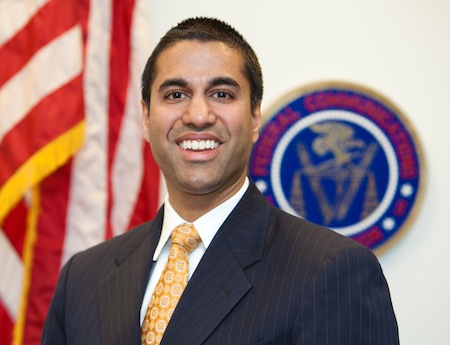FCC's Pai: Fire Up the Regulatory Weed Whacker

The smarter way to stay on top of broadcasting and cable industry. Sign up below
You are now subscribed
Your newsletter sign-up was successful
Republican FCC commissioner Ajit Pai, who could be interim FCC chair, says the Donald Trump Administration can be an inflection point for the FCC, which under new management should start asking of every regulation: Does it address a market failure, and if so, does it correct it, and if so, do the benefits of the regulatory solution outweigh the costs.
For those that don't meet the test, he suggested it is time to "fire up the weed whacker and remove those rules that are holding back investment, innovation, and job creation."
Pai was speaking at the tenth anniversary of the Free State Foundation, a free market think tank that shares Pai's goals of limited government regulation and more cost-benefit analysis of the regs that remain.
"[P]roof of market failure should guide the next Commission’s consideration of new regulations," said Pai. "And the FCC should only adopt a regulation if it determines that its benefits outweigh its costs."
An FCC under Pai would clearly try to roll back the FCC's Title II reclassification, which Pai has consistently said held back investment, innovation and job creation.
Pai recalled his early predictions, which he could now have a hand in effectuating: "On the day that the Title II Order was adopted, I said that 'I don’t know whether this plan will be vacated by a court [it was not], reversed by Congress [that is now one realistic possibility], or overturned by a future Commission,'" he said. "'But I do believe that its days are numbered.' Today, I am more confident than ever that this prediction will come true. And I’m hopeful that beginning next year, our general regulatory approach will be a more sober one that is guided by evidence, sound economic analysis, and a good dose of humility."
Pai has been a long and strong critic of current FCC chairman Tom Wheeler, both on process and policy.
The smarter way to stay on top of broadcasting and cable industry. Sign up below
Pai signaled that where he had questions about the FCC authority, he would look to Congress for guidance rather than presume that authority, something he accused the Wheeler FCC of doing, citing court defeats on preempting municipal broadband, for one.
"The FCC is a creature of Congress, and it strains our legitimacy when we exceed the limits it’s placed on us," he said. "It’s also a waste of time and effort. For when a court invalidates a Commission order, as it did in the municipal broadband case, we end up accomplishing nothing."
Pai also said the FCC should start releasing the text of documents it is voting at public meetings and "establishing an FCC Dashboard with key performance metrics, we can better enable the public to know what and how we are doing."
Contributing editor John Eggerton has been an editor and/or writer on media regulation, legislation and policy for over four decades, including covering the FCC, FTC, Congress, the major media trade associations, and the federal courts. In addition to Multichannel News and Broadcasting + Cable, his work has appeared in Radio World, TV Technology, TV Fax, This Week in Consumer Electronics, Variety and the Encyclopedia Britannica.

